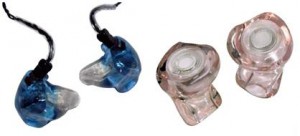Hearing “noise” isn’t always a bad thing
Jason, a 26-year-old college student, sat across the desk during his appointment and explained his concerns:
“I’ve noticed that the ringing in my ears is especially bad after I’ve been listening to music for awhile…I first started hearing the ringing several years ago, after an especially loud concert, so I started being better about keeping the volume down on my stereo and MP3 player. I guess I haven’t been as careful about it in the past few months, though, and I’ve definitely noticed that the ringing has gotten worse.”
The “ringing” that he is referring to is called tinnitus, and it often occurs after a person has been exposed to excessive noise. In Jason’s case, the “noise” was actually his music, so he found himself in a dilemma that is common to many music fans…how can he enjoy his music while ALSO making sure he protects his hearing? When it comes to other types of noise (i.e., power tools, construction sites, firearms, etc.), it seems pretty straightforward to use hearing protection. But what if the “noise exposure” is actually something that the individual is WANTING to hear?!
Take proper steps to protect the hearing
Protecting your hearing is not necessarily difficult…being MOTIVATED to protect your hearing is typically the challenge. Decades ago, industries (and the military) were not very good about taking measures to help employees protect their hearing. This, combined with a lack of awareness among those employees, resulted in an entire generation of people who learned (the hard way) how important it is to put in earplugs. These days, there are standards and regulations for occupational health, including hearing health (click here for a list of organizations who have done their part to increase awareness regarding hearing protection). In addition, employers often have a true concern for encouraging — or downright requiring — their employees to use hearing protection devices (or HPDs). Individuals are also more aware of the risks of noise exposure, so they are more motivated to use HPDs whether they’re required to or not. But what if, instead of working in the mines, a person is working in a recording studio? Or, instead of taking orders from a commanding officer in the military, he is taking orders from a patron in a noisy bar? How about the person that wields an electric guitar instead of a jackhammer? These are all situations where the person likely SHOULD be taking steps to protect their hearing…but they are likely not.
What can be done?
Going back to Jason, our 26-year-old student, the answer could be as simple as educating him on the risks of listening to high levels of noise (ANY noise) for long periods of time. If he’s motivated, then he will take the proper steps to limit the exposure by turning down the volume and taking breaks from his music. But this brings up an important point: motivation is key. If an employer REQUIRES a person to put in earplugs, they will (hopefully) be motivated to do so…but what about a concert musician or bartender? Well, the answer is similar to what we did for Jason: education. There are a lot of options when it comes to taking steps to protect hearing…people just need to be aware of those options.

An ounce of prevention…
There are still plenty of people out there who have no idea that they are possibly damaging their hearing. Fortunately, Jason was attentive enough to recognize that something was not right when he had an increase in his tinnitus. But people don’t always pay enough attention to that type of a warning sign. And loud noise can be damaging without causing pain or discomfort…so a person may not even be aware of the damage that is occurring. That’s why it’s our job to educate on the importance of using hearing protection, and offer guidance on which types of solutions might be right for any given individual or situation. After all, isn’t it easier to help Jason “turn it down” now…rather than trying to help him “turn it up” (via hearing aids) 20 years from now?